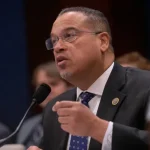
When a federal prosecutor’s top critics include the nation’s top justice, the rest of the country should be seeing warning signs.
When that prosecutor’s current target is a former president of the United States, who currently presents the strongest challenge to the administration now in power, those warning signs should move into outright alarms over a perversion of “justice” by the nation’s Justice Department.
But that’s exactly what the country is seeing in special counsel Jack Smith, whose view of the law is apparently so warped it once united an ideologically split Supreme Court to reject it — and drew notable criticism from Chief Justice John Roberts in the process
Smith, head of the Justice Department’s Public Integrity Section from 2010 to 2015, according to The Washington Times, is a veteran prosecutor with scores of high-profile cases behind him.
One of his biggest cases involved former Virginia Gov. Bob McDonnell, a Republican who was on the shortlist to be the running mate of GOP presidential nominee Mitt Romney in 2012.
Trending:
Smith obtained an indictment of McDonnell and his wife in January 2014, as the Washington Examiner detailed in a November 2022 report.
McDonnell and his wife were convicted in September 2014, CBS News reported at the time, after a trial that featured tawdry details of the couple’s marital difficulties. (They later divorced.)
They were found guilty of supposedly trading the powers of Bob McDonnell’s office for favors from a Virginia businessman.
Is Donald Trump getting a fair treatment from Jack Smith’s prosecution team?
Yes: 6% (1 Votes)
No: 94% (15 Votes)
When the guilty verdict came after three days of jury deliberation, McDonnell’s attorney told reporters he planned to appeal.
The case finally reached the Supreme Court, which threw out the McDonnell verdict in a unanimous decision in 2016, according to the Examiner.
That was after Smith had left the section, but the conviction was part of his record in the unit. As thumping as that result was for the government’s case, Roberts’ explanation was even worse for the team.
Writing on behalf of the court, Roberts simply demolished the theory of the prosecution as “inconsistent with both text and precedent.”
The prosecution’s “expansive interpretation of ‘official act’ would raise significant constitutional concerns,” Roberts wrote.
“Conscientious public officials arrange meetings for constituents, contact other officials on their behalf, and include them in events all the time. Representative government assumes that public officials will hear from their constituents and act appropriately on their concerns. The Government’s position could cast a pall of potential prosecution over these relationships.”
In short, Smith’s unit was trying to criminalize politics — something that might work well in a Justice Department overseen by a self-righteous ideologue like Attorney General Merrick Garland but does not fit the mission of the Justice Department in an American system of government.
In fact, Roberts noted, White House counsels from both parties — from the 1980s to the time of the McDonnell case, had warned that the section’s approach represented a “breathtaking expansion of public-corruption law” that “would likely chill federal officials’ interactions with the people they serve and thus damage their ability effectively to perform their duties.”
In addition, Roberts wrote, six former attorneys general from Virginia — four Democrats and two Republicans — as well as 77 former attorneys general from other states — 41 Democrats, 35 Republicans and one independent — had written the court to weigh in against the government’s case.
That’s not the only case where Smith has ended up on the wrong side of events.
Smith’s unit also won an indictment of former Democratic vice presidential candidate John Edwards on campaign finance charges but lost the case in a mistrial when the jury couldn’t agree on a conviction. The Justice Department did not try it again, the Examiner reported.
The Public Integrity Section did manage to put away former Arizona GOP Rep. Rick Renzi of extortion charges in 2013, as a Justice Department news release from the time shows, but Renzi was pardoned by Trump on his final day in office.
Renzi maintained his innocence, according to The Washington Times, and had a jaundiced view of his prosecutors.
“These are no white knights. They are very dangerous and will use any tactics to win at all costs,” he told the Times.
It’s safe to say that’s the way most convicts feel about their prosecutors, but Smith is clearly a different case. He’s shown a profound willingness to bend the law to serve his purposes in a way that was so unacceptable that every Supreme Court justice — liberal and conservative — in 2016 overturned arguably his biggest conviction.
Getting an indictment is different from getting a conviction — as the Edwards case shows — and Smith’s indictment of Trump is so obviously, obscenely political that it hasn’t hurt Trump’s candidacy in the least (at least not yet).
And as that Roberts ruling indicates, Smith’s brand of lawfare is antithetical to the very nature of the American legal system.
It might suit Smith well as an attack dog for the conniving Merrick Garland. He might fit in just fine with all the other made men of the Biden Justice Department.
But it’s not going to help to convince the rest of the country he’s not simply on a vendetta to win a conviction at all costs — regardless of its merits in a true system of justice.
Smith apparently isn’t worried too much about niceties like that. John Roberts’ opinion made that clear.






